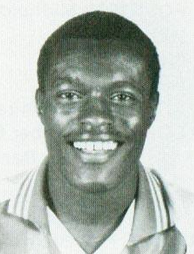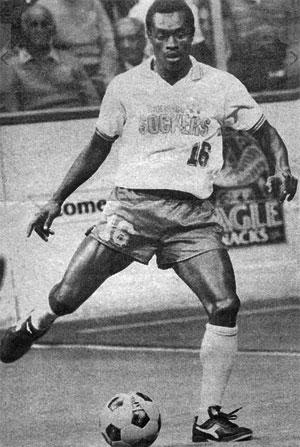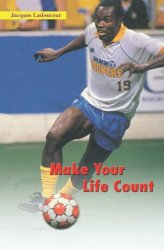Ladouceur on Developing Soccer Players

Jacques LaDouceur is a former professional Haitian-American soccer forward. LaDouceur played in Greece for two seasons before returning to the U.S. and playing eight years of indoor soccer.
LaDouceur is a world class coach and former professional soccer player who is dedicated to giving back to the game and helping players and their parents understand the beautiful game. Ladouceur says, “Parents need to realize that soccer is not that easy. Once parents learn how difficult the techniques are, they understand they should be more encouraging. It does take a lot of effort and training for all ‘these cuts to the right and to the left’.
 Ladouceur was once referred to as an aspiring radio show host by the LA Times & is a former communications major from Howard University. A native of Haiti, Ladouceur was born in Port-au-Prince in 1959 and played soccer in Greece before playing 8 seasons of indoor soccer and playing on the U.S. National Team in 1984 and 1985. Always passionate about soccer, Ladouceur wrote a book ‘Make Your Life Count’, available on Amazon.
Ladouceur was once referred to as an aspiring radio show host by the LA Times & is a former communications major from Howard University. A native of Haiti, Ladouceur was born in Port-au-Prince in 1959 and played soccer in Greece before playing 8 seasons of indoor soccer and playing on the U.S. National Team in 1984 and 1985. Always passionate about soccer, Ladouceur wrote a book ‘Make Your Life Count’, available on Amazon.
According to Ladouceur, development is a buzz word he noticed more than twenty years ago. He was surprised it took the U.S. Soccer Federation this long to realize there was an issue in youth soccer when it came to player development. Ladouceur know that wining is very important becaus, he knows it develops confidence and it proves that hard work does pay off but it should never come before development. Developing the soccer player should be a coach’s main focus in youth sports.
“Development is a great topic for discussion except for the fact that very few people care about it like I do,” said Ladouceur. “When you walk the sidelines of youth soccer, unless its kids playing that grew up in a different culture, there is very little skill being displayed. Very few kids today can dribble past one player and create something on the field because during their short soccer career they have heard about five million times to pass, boot it, kick it out or get rid of it. Even with the success we’ve had, just take a look at the U.S. team and see how many players can create off the dribble?”
There are 21.5 million kids involved in youth sports from age 6-17 in the U.S., and Ladouceur held the first parent education program in January 2015.
Along with development Ladouceur does not believe players are getting a good grasp on the understanding of the game. “Players expect coaches to teach the understanding, which I believe they do,” said Ladouceur. “However, kids don’t pay enough attention to soccer on television or in person the way they should to get a good understanding of where to be on the field or how to anticipate and read the game. This is what I call a very low soccer I.Q.”
“When a kid starts playing soccer at 5 years old they should surely have a good understanding of the game by age 12, right? I think there’s too much coaching between the age of 5 to 12 and we will never develop creative players if we continue in that direction.”
 Ladouceur believes that US Soccer should remove the competitive league from age 5 to 12 to allow players and team to practice three times a week and focus on development. In a competitive league environment, winning comes first, which creates a vicious cycle that Ladouceur says can not easily be broken.
Ladouceur believes that US Soccer should remove the competitive league from age 5 to 12 to allow players and team to practice three times a week and focus on development. In a competitive league environment, winning comes first, which creates a vicious cycle that Ladouceur says can not easily be broken.
“I see parents as the customers of club soccer who want to win or they will leave the team or the club. Even at the U8 level, coaches are forced to create a winning strategy, which kills development. Coaches should be willing to lose games in order to develop players. When I went to my first Olympic tryout no one asked me if the teams I played on had a winning record. As parents our time and money investment should be on development, not winning trophies,” said Ladouceur.
If we focus solely on development from age 5-12, Ladouceur believes we can help kids have the freedom to be creative and we can focus most of our time as coaches on teaching basic skills, not so much game strategy. “We can work on shooting for a week to help our players understand the mechanics of shooting,” said Ladouceur. “I think at age 12 when they do join a competitive team, they are ready to compete and will not burn out from soccer at the age of 15.”
“I think the number of kids that quit playing soccer is more than 70 percent ,and who can blame them with the weekly pressure to win, the hours of traveling and the stress that parents create?”
Ladouceur wants us to ask “What do our beloved children learn from our behavior?” We all know the answer to that question – sometimes our actions are less perfect than we want. But really, does the saying do as I say, not as I do really work? Has anyone ever listened to that? Aren’t we a bit embarrassed to even say it?






